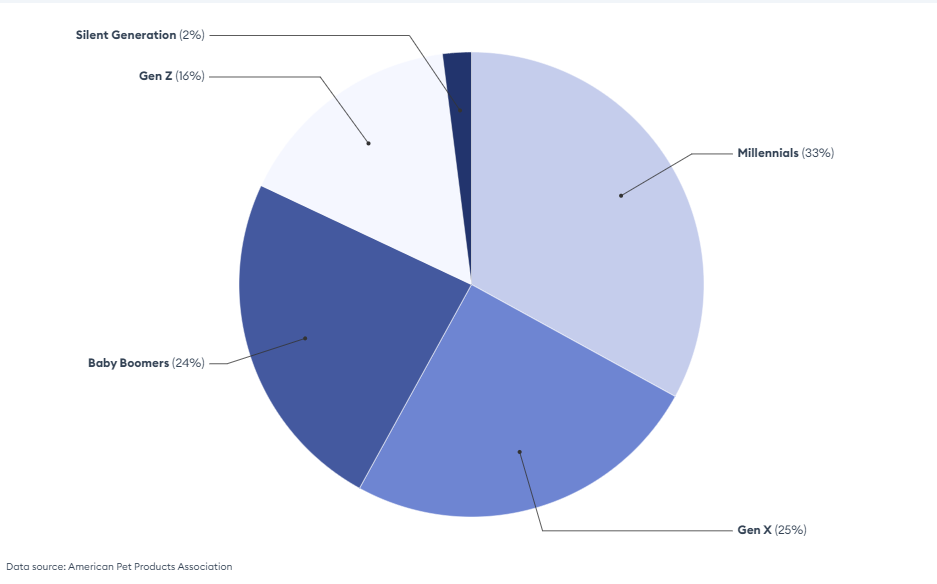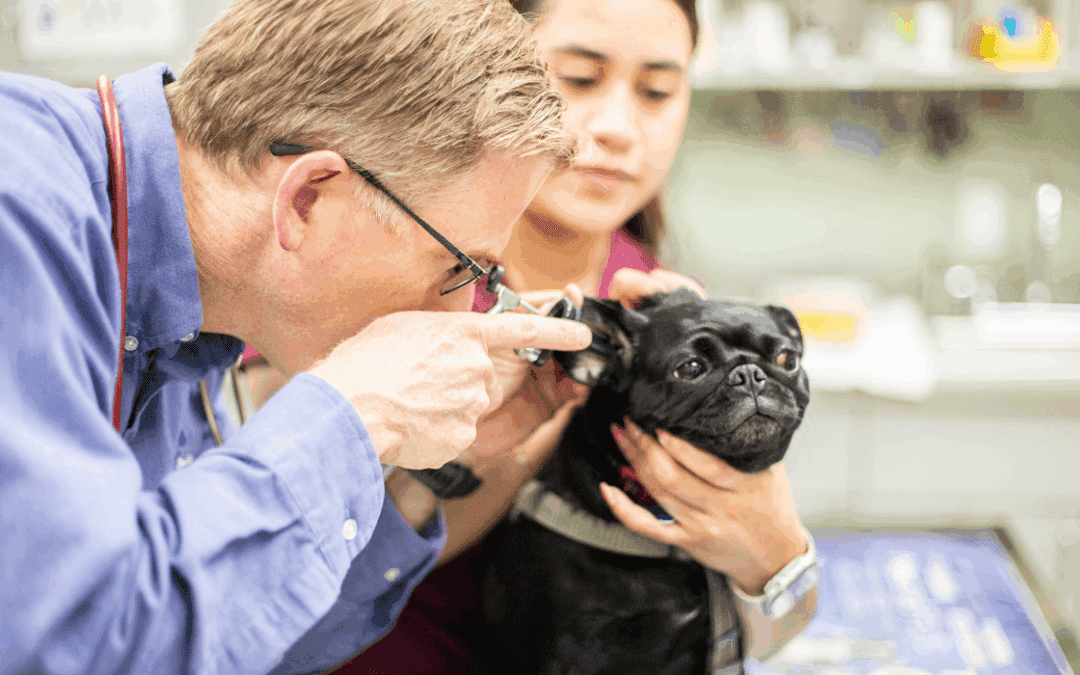Table Of Contents
- Introduction: The Importance of an Exceptional Veterinary Website
- Key Hallmarks of an Exceptional Veterinary Website
- What in the World is “SEO”?
- Leveraging Reviews: Building Trust With Veterinary Clients Online
- Understanding Pet Owner Expectations
- Why Does Social Media Presence Matter for My Veterinary Clinic?
- How PetDesk Websites Enhance Veterinary Practices’ Online Presence
Introduction: The Importance of an Exceptional Veterinary Website
A strong social media presence and a user-friendly veterinary clinic website are crucial to effectively engage with pet owners. These platforms serve as virtual gateways to these pet owners, offering valuable resources and convenience at their fingertips. Imagine the clinic’s website as its digital front door, welcoming pet owners with essential information and helpful resources. However, the importance of user-friendliness goes beyond mere convenience; it’s essential for retaining online visitors. Studies show that a staggering 88% of online users won’t return to a website after a poor experience. Therefore, ensuring a seamless and intuitive website experience is important for engaging and retaining pet owners in today’s competitive digital landscape.
Pet owners expect to navigate a clinic’s website with ease, finding the relevant information quickly and efficiently. This includes essential details such as clinic hours, location, contact information, and the services offered. A clean and intuitive website layout, accompanied by clear and concise content, enhances the user experience and instills confidence in the clinic’s professionalism and reliability.
Key Hallmarks of an Exceptional Veterinary Website
- Easy Navigation: Clear menus direct visitors to key sections like appointment booking, services, and pricing, ensuring a seamless browsing experience.
- Mobile-Friendly Design: Designing a website to operate well on a mobile device is also critical, as many pet owners rely on their smartphones or tablets to access information and services on the go. A mobile-friendly website ensures that pet owners can easily navigate the site and book appointments from any device, enhancing convenience and accessibility. 40% of users will leave a site if it takes more than three seconds to load, according to Forbes.
- Transparent Information: Make sure to clearly display the full services offered, business hours, and pricing without hidden fees or confusing terminology, enabling informed decision-making for pet owners. By making this important information clear, you’ll reduce the need for them to call your clinic.
- Engaging Visuals: High-quality images showcase your veterinary clinic’s environment, staff, and pets, creating an inviting atmosphere for visitors. Good imagery is essential in making a strong first impression and promoting trust and credibility.
- Social Proof: Rave reviews and heartfelt testimonials from satisfied clients instill trust and confidence in prospective pet owners. Be sure to respond to all reviews—especially any negative reviews.
- Educational Resources: Your veterinary clinic’s extensive pet care tips, FAQs, and articles demonstrate your commitment to comprehensive pet wellness beyond medical care. It also promotes credibility and builds trust with your clients.
- Convenient Appointment Booking: A veterinary online booking system streamlines the appointment scheduling process, saving time for both clients and clinic staff. The website should seamlessly integrate with the online booking system, allowing pet owners to easily access the booking platform directly from the website. This integration ensures a smooth transition from browsing services to scheduling appointments, minimizing friction in the booking process and encouraging pet owners to take action.
- Integration With Pet Health Portals: Integration with platforms like PetDesk facilitates the easy management of pet records and prescriptions, boosting convenience for your clients and staff.
- Informative Blogs: Regularly updated blog content keeps visitors informed about the latest news and tips in pet care.
- Easy Contact Information Access: Clear contact details and interactive maps make it simple for visitors to find the veterinary clinic’s location and get in touch during or outside of open hours. Additionally, providing clear instructions on what to do when the clinic is closed, such as emergency contact information or directions to the nearest emergency veterinary clinic, ensures pet owners feel supported and informed at all times.
See what PetDesk makes possible
Our solutions are designed to tackle your clinic’s specific challenges.
Set up time with a PetDesk expert to see for yourself!
What in the World is “SEO”?
Let’s face it: SEO can leave us scratching our heads, but here’s a more straightforward way to grasp what it’s all about: SEO, or Search Engine Optimization, is like a map for the internet. Imagine you’re looking for the best pizza place in town. SEO helps search engines like Google identify websites for the tastiest pizza places, and Google shows them to you first when you search for things like “Pizza near me” or “Best pizza place”. So, when someone searches for something online, good SEO helps websites show higher results, making them more likely to be seen.
How to Know if Your SEO Health is Good
You can gauge the health of your SEO by examining various metrics and indicators; here are a few important ones you can keep track of:
- Organic Traffic: Monitor the traffic coming to your veterinary website from organic search. Over time, an increase in organic traffic suggests that your SEO efforts are paying off.
- Keyword Rankings: Check where your veterinary website ranks for target keywords in search engine results pages (like Google!). Higher rankings indicate that your website is relevant and authoritative for those keywords.
- Page-Loading Speed: Assess how quickly your web pages load, both on desktop and mobile devices. Fast-loading pages contribute to a positive user experience and can improve search engine rankings.
- Mobile-Friendliness: Ensure that your website appears correctly on mobile devices. Google prioritizes mobile-friendly websites in search results so they appear on the first page.
- User Engagement Metrics: Analyze user engagement metrics such as bounce rate, time on page, and pages per session. Higher engagement metrics indicate that visitors find your content valuable and relevant.
- Conversion Rate: Track the percentage of website visitors who complete desired actions, such as purchasing, filling out a contact form, or subscribing to a newsletter. A healthy conversion rate indicates that your website is effectively meeting the needs of your target audience.
By regularly monitoring these metrics and making adjustments as needed, you can ensure that your SEO health remains strong and your website performs well in search engine results.
Three Things You Can Do to Improve Your SEO Rankings
- Optimize On-Page Elements: Make sure your website’s titles, meta descriptions, headings, and content match your target keywords. Each page should have unique titles and descriptions that accurately describe what’s on the page. When using keywords in your content, make sure to use them naturally and avoid overloading. Google can detect when keywords are used unnaturally.
- Create High-Quality Content: Develop compelling, informative, and engaging content that addresses the needs and interests of your target audience. Focus on creating content that provides value, solves problems, or answers questions relevant to your industry or niche. Incorporate multimedia elements such as images, videos, and infographics to enhance the user experience and encourage engagement.
- Local SEO: If you serve a specific geographic area, optimize your website for local search. This includes creating a Google My Business profile, optimizing your website for local keywords, and earning positive reviews from satisfied customers. Local SEO tactics can help you appear in local search results and attract nearby customers.
Leveraging Reviews: Building Trust With Veterinary Clients Online
Online reviews, whether on Google or other platforms, serve as powerful trust signals for veterinary clinics. Just like when you’re scouting out a new restaurant or gadget, prospective pet parents often turn to reviews to gauge the reputation of a clinic. When pet owners encounter glowing testimonials, they’re reassured that they’ve discovered a trustworthy and top-notch establishment for their beloved pets. Encouraging positive reviews and testimonials, whether on Google, social media, or your website, helps bolster your veterinary clinic’s social proof and strengthens its online presence. Plus, from an SEO perspective, Google favors websites with robust review profiles, making them more visible in search results.
See what PetDesk makes possible
Our solutions are designed to tackle your clinic’s specific challenges.
Set up time with a PetDesk expert to see for yourself!
Understanding Pet Owner Expectations
From a pet owner’s perspective, the quest for veterinary care starts with the need for simplicity and user-friendliness. They expect to find a booking platform that’s intuitive and accessible, allowing them to quickly and efficiently schedule appointments at their convenience. The ability to access the platform from any device, whether it’s a smartphone, tablet, or computer, is essential for busy pet owners.
The surge in pet ownership over the last twenty years is largely attributed to younger generations. In fact, a staggering three out of every four millennials in the United States are proud owners of either a dog or a cat. Forbes explains that Millennials make up the largest percentage of current pet owners (33%) in 2024, followed by Gen X (25%), and baby boomers (24%).

Source: Forbes Advisor, 2024
Here are a few things pet owners expect when visiting their veterinary clinic’s website, and what’s important to them:
- Transparency and clarity when using online booking tools.
- The ability to easily view available appointment slots, understand the services offered, and have clear communication regarding appointment details and any associated costs.
- A user-friendly interface with clear instructions and prompts.
- Personalized experiences and attentive customer service.
Why Does Social Media Presence Matter for My Veterinary Clinic?
Clinics that maintain an active and engaging presence on social media platforms, regardless of size, can significantly enhance their relationships with pet owners.
Social media is a powerful tool for clinics to connect with their community, share valuable pet care tips and information, and showcase the compassionate care provided by their team. Pet owners appreciate clinics that actively engage with them on social media, responding to inquiries, addressing concerns, and fostering a sense of community among fellow pet lovers.
Moreover, a strong social media presence can further streamline the booking process by providing convenient options for pet owners to schedule appointments or reach out for assistance. Many clinics leverage social media platforms to promote special offers, announce upcoming events, and share important updates, creating additional touchpoints for pet owners to engage with their clinic.
Another important factor to consider is that pet owners often turn to social media to seek recommendations from friends, family, and other pet owners when choosing a veterinary clinic. A positive and active social media presence can help clinics build trust and credibility within their community, attracting new clients and retaining existing ones.
How PetDesk Websites Enhance Veterinary Practices’ Online Presence
If you’re feeling overwhelmed by the idea of managing your veterinary website and online presence, look no further—PetDesk has the perfect solution to take care of all of this for you. We’ll help you reduce busy work and focus on what really matters: taking care of your clients and patients.
Why choose PetDesk?
Our platform is dedicated to creating beautiful websites for veterinary clinics that are customized to your preferences. These websites come equipped with the latest apps and are optimized with meta tags and descriptions to rank well on Google. You can also track your website traffic in real time and integrate it with your favorite veterinary and pet portal apps. We offer a comprehensive solution for all your website needs.
PetDesk Websites also come packed with additional features, including:
- Custom-Built, Mobile-Responsive Website: No templates! Utilizing our software, we’ll tailor a website to your exact needs. Your site will shine on any device—be it a computer, tablet, or smartphone—with flawless functionality and design.
- Your Own Web Team: Entrust your site’s operation, management, and updates to our team of experts. Need changes or updates? Just let us know! We’re here to promptly address any inquiries you may have.
- Cloud Hosting: Hosted on our cloud server, your website will boast lightning-fast speed and top-notch security. You’ll no longer have to worry about updates or downtime.
- Advertising Management: If you’d like to dive into social media or Google advertising, we can help. We’ll get you started, and we’ll also continuously optimize your ads to maximize your Return on Investment (ROI).
- Search Engine Optimization (SEO): We’ll make sure your website stands out when pet owners search for a veterinarian in their area.
- Analytics: Gain insights into your website’s performance with real-time reporting accessible 24/7 on your dashboard. Know your visitor numbers, their demographics, and more.
- Social Media Marketing: Let us elevate your social media presence. We’ll help you engage current clients and attract new ones, handling every aspect of your social media marketing.
- Reputation Management: Have peace of mind knowing we’ll monitor your Google reviews and collaborate with you should you need to address or take action on any feedback.
Getting started is a breeze—simply request a demo in just a few minutes!
Creating an Exceptional Veterinary Website FAQs
Q. What content should I include on my veterinary website to engage visitors?
A. To engage visitors, your veterinary website should include informative and engaging content such as educational articles on pet care, wellness tips, and preventive healthcare measures. You can also incorporate captivating visuals like photos and videos of pets, staff members, and clinic facilities. Testimonials from satisfied clients, blog posts addressing common pet health concerns, and interactive features such as quizzes or polls can further enhance visitor engagement. Additionally, providing resources for pet owners, such as downloadable guides or FAQs, adds value and encourages repeat visits to your website.
Q. Do I need to include client testimonials or reviews on my website and, if yes, how can I encourage feedback from my customers?
A. Yes, including client testimonials or reviews on your veterinary website can significantly boost credibility and trust among potential clients. To encourage feedback from your customers, you can implement various strategies such as sending follow-up emails after appointments requesting feedback, displaying review prompts on your website, and incentivizing clients to leave reviews with discounts or rewards. Additionally, providing excellent customer service and engaging with clients on social media platforms can encourage them to share their positive experiences with your clinic.
Q. How often should I update and refresh content on my veterinary clinic’s website to keep it relevant and engaging for visitors?
A. To keep your veterinary website relevant and engaging, updating and refreshing content regularly, ideally at least once a month, is advisable. This could include adding new blog posts or articles on pet care topics, updating service information, refreshing images and visuals, and incorporating recent client testimonials or reviews. By consistently providing fresh and valuable content, you can keep visitors returning to your website and demonstrate your commitment to providing up-to-date information and services.
Q. How can I stay informed about trends and best practices in veterinary website design and digital marketing?
A. To stay informed about emerging trends and best practices in veterinary website design and digital marketing, consider subscribing to industry publications, attending webinars and conferences, and joining professional associations or online communities for veterinarians. Additionally, you could follow reputable digital marketing blogs and social media accounts, participate in networking events, and engage with fellow professionals to exchange ideas and insights. Regularly seeking out educational opportunities and staying connected with peers will help you stay abreast of the latest developments and innovations in the field.
Q. How can I ensure that my website reflects my veterinary clinic’s unique brand and personality?
A. To ensure that your website reflects your veterinary clinic’s unique brand and personality, focus on incorporating elements that convey your clinic’s values, mission, and ethos. This includes using consistent branding elements such as colors, fonts, and logos throughout the website and incorporating imagery and visuals that resonate with your target audience. Additionally, infuse your website copy with your clinic’s tone of voice and messaging style, conveying warmth, professionalism, and empathy. By aligning your website design and content with your clinic’s distinct identity, you can create a memorable and authentic online presence that resonates with visitors.
See the power of PetDesk for yourself—for free
Save time and grow your business with custom websites and digital marketing, 24/7 error-free booking, a PIMS-VoIP phone system, plus a client engagement platform with a mobile app.






